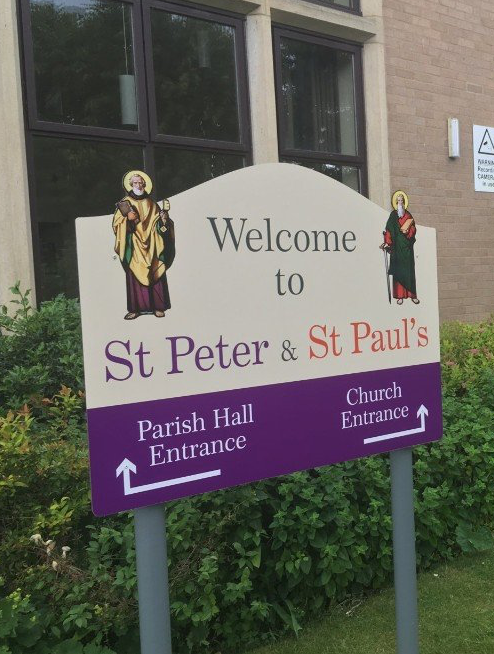How to defend the Faith – While having the proper information is crucial, the aim in answering critics of Catholicism and its teachings should be to win the soul, not the argument
Have you ever found yourself in the middle of a conversation with someone when, suddenly, he or she blurts out a derogatory remark about the Catholic Faith or asks you a question about Catholicism that you can’t answer? If you’re like most Catholics, you have — at least at one time or another. Whether it’s in person or through social media, Catholics often find themselves in a position of having to either defend or clarify the Faith. That can leave us feeling challenged and scrambling for answers.
Fortunately, there are ways to approach these situations, resources available to find the answers and knowledgeable people who can guide us in these everyday apologetics situations.
Attitude is key
Before attempting to respond to challenges or answer questions, there are some things to know that will help make it easier for both you and the person with whom you’re conversing. The most important is your attitude.
“There is no greater turnoff than a know-it-all,” said Mark Hart, author, speaker and executive vice president for Life Teen International. “Joyful confidence, on the other hand, is not only contagious but attractive. The more we realize that our religion is about a relationship, that it’s about a who and not a what, the better off we will be. Share Christ’s love first, and sharing his truth will become far easier.”
The second important factor is humility; don’t be afraid to admit that you don’t know the answer. Never brush the person off or fake an answer because that will do more harm than good.
“Don’t be afraid to admit that you don’t know the answer to a question or how to respond to criticism of the Faith,” said Patrick Madrid, Catholic author, radio host and apologist. “Never pretend to have the answer. Tell them, ‘That’s a great question’ or ‘That’s an interesting point,’ and let them know that you don’t have the answer for them right now, but that you will find out and get back to them. Then be sure to get back to them as soon as possible.”
Resources available
Where do you go when you don’t know the answers? There are a number of resources, both in print and online that can help you. The Bible, Catechism of the Catholic Church, Code of Canon Law, writings of the Church Fathers, Catholic.com and OSV.com are among some of the most frequently used resources. Even doing an Internet search of the topic will bring up helpful sites; just be sure that the site is reliably Catholic.
“There’s an embarrassing wealth of materials available to Catholics today,” said Steve Ray, a film producer, author, Holy Land pilgrimage guide and apologist. “And they’re all just a few pages or mouse clicks away.” Ray points out the necessity for Catholics to know the Bible well, because that tends to be the greatest point of contention between non-Catholics and Catholics.
“It’s a misperception that Evangelicals know more about the Bible than Catholics,” he said. “They don’t. They may be able to quote passages, but they don’t fully understand them and don’t know how to interpret them.
“They’re only taught key phrases to use when confronting Catholics and what kind of approach to use. Catholics must remember that we have the correct interpretation — more than 2,000 years’ worth — while the Protestants only have about 500 years. We can’t let ourselves be overwhelmed,” Ray said.
Dig into the Faith
Feeling inadequate about our knowledge of the Faith can keep us from speaking out about our Catholic Faith, but that needn’t be the case.
“No one can have all the answers at hand,” said Catholic apologist and author Dave Armstrong. “I certainly don’t, and I’ve been defending the Catholic Faith for over 23 years. On the other hand, someone who feels like they have to instantly reply, even if they are ill-equipped, turns people off. We have all these wonderful aids available, where we can find some sort of good answer to almost any question, with a little practice using Google to search for materials. With email and Facebook and all of these ways now to connect with other people, it’s really easy to send them a link to someone who does know a lot more about the topic at hand. In that sense, I think defending the Faith is easier than ever.”
The best approach is to be prepared ahead of time so that we’ll have at least a working knowledge when questioned about the Faith.
“Apologetics is not a topic or hobby nor even a strategy,” Hart said. “Apologetics — especially in this modern, subjective and highly pagan culture — is an art form and approach to life. We must become living apologists, vibrantly and joyfully living out the Catholic Faith in its beauty and fullness, humbly yet boldly, to all we encounter.”
A gentle approach
Many Catholics hesitate to defend their Faith because they fear confrontation. Training ourselves ahead of time equips us to address questions and misconceptions while at the same time diminishing the stress of uncertainty about the Faith. It’s not uncommon to accidentally — or not so accidentally — overhear conversation in which someone is badmouthing the Catholic Church and its teachings.
“What I do is to make the basic point that most people readily agree with: there are two sides to every story,” Armstrong said. “This appeals to the fair-mindedness that is still a valued ideal in our society. Once that is granted, then we can ask them if they would like to hear how the Catholic would respond.”
You might also try coming from another angle. Kevin Vost, Catholic author and psychologist, suggests using the method Benjamin Franklin used to point out error or misrepresentation. Franklin would use gentle language such as, “it seems to me,” “perhaps,” “have you considered the possibility that …” in order to avoid putting the other person on the defensive even when he was certain about his own knowledge and opinion. “You might start by asking simple questions, like inquiring about the listener’s sources of information,” said Vost. “Few people who critique authoritative Catholic teaching (including Catholics), have ever actually read any. If you have acquired enough basic knowledge in apologetics you might then be able to gently persuade the person who challenges the Faith to consider facts that she has never considered.”
‘Everybody’s job’
No matter how hard we try or how much we know about the Faith, some people will still resist or even be hostile toward us. Regardless, it is essential to treat them with charity and respect and demonstrate a true concern for the person — even if their reasoning is faulty.
“It’s vital to remember that if the person you’re speaking to does not believe — beyond the shadow of a doubt — that you genuinely care about them and their soul, it doesn’t matter what you say,” Hart said. “They have to believe you care about them and not about winning an argument. If they do, proceed. If they don’t, pray for them and save your breath.”
No matter what the situation, we are all responsible for defending the Faith. That’s exactly what St. Matthew referred to in Chapter 5 of his Gospel: “You are the light of the world.”
“Apologetics is everybody’s job,” Ray said. “The word apologetics comes from the Latin apologia , which does not mean to apologize but rather to explain and defend.”
OSV Newsweekly (Press control and click on this link) Marge Fenelon writes from Wisconsin.











